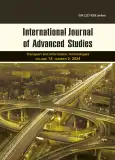Development of a Web Application for the Conference “Pedagogical Potential”
- Authors: Kamozina O.V.1, Okhlupina O.V.1, Magankov K.S.1, Ryabtsev N.P.1
-
Affiliations:
- Bryansk State Engineering and Technology University
- Issue: Vol 14, No 2 (2024)
- Pages: 123-144
- Section: Articles
- Published: 30.06.2024
- URL: https://bakhtiniada.ru/2328-1391/article/view/299632
- DOI: https://doi.org/10.12731/2227-930X-2024-14-2-287
- EDN: https://elibrary.ru/XKLFQN
- ID: 299632
Cite item
Full Text
Abstract
The relevance of the research topic necessitated constant cooperation and exchange of experience between teachers and students of various educational institutions. At the same time, it is necessary to reduce the costs of organizing conferences, simplify the processes of submitting applications, articles, paying registration fees, distributing materials, etc. In this regard, there is a need to use digital technologies in holding various types of conferences.
Purpose – develop a web application for holding a conference.
Materials and methods. To achieve this goal, the article defines the technology stack for project implementation. Modeling, analysis, and synthesis methods were used.
Results. The paper describes the process of implementing the technical and client parts of a web application for organizing a conference. The routes for interaction between the client and the database and sending requests to the application server are highlighted. The creation of a web application database is presented, as well as the interaction of the web application with the server. Filling of the main page has been implemented. The form for submitting applications for participation in the conference has been determined. The capabilities of participants and administrators are differentiated.
Scope of application of the results. The web application was included in the All-Russian Scientific and Practical Conference “Pedagogical Potential” with international participation, held on November 27, 2023 at the Bryansk State Engineering and Technology University. The results obtained can be used to conduct conferences at various levels.
Keywords
About the authors
Olesya V. Kamozina
Bryansk State Engineering and Technology University
Author for correspondence.
Email: ovkamozina@yandex.ru
ORCID iD: 0000-0003-2803-6016
Associate Professor, Department of Mathematics, Candidate of Physical and Mathematical Sciences
Russian Federation, 3, Stanke Dimitrova Ave., Bryansk, 241037, Russian FederationOlga V. Okhlupina
Bryansk State Engineering and Technology University
Email: helga131081@yandex.ru
ORCID iD: 0000-0003-0694-2990
Associate Professor, Department of Mathematics, Candidate of Physical and Mathematical Sciences
Russian Federation, 3, Stanke Dimitrova Ave., Bryansk, 241037, Russian FederationKirill S. Magankov
Bryansk State Engineering and Technology University
Email: kirill.magankov@gmail.com
Student
Russian Federation, 3, Stanke Dimitrova Ave., Bryansk, 241037, Russian FederationNikolay P. Ryabtsev
Bryansk State Engineering and Technology University
Email: lolofmeistahhz@gmail.com
Student
Russian Federation, 3, Stanke Dimitrova Ave., Bryansk, 241037, Russian FederationReferences
- Alan Bewley. Learning SQL. (Transl. from English) M.: Symbol-Plus, 2017, 309 p.
- Barry Pollard. HTTP/2 in action. (Transl. from English) M.: DMK-Press, 2021, 424 p.
- Bogdanova I.F. Nauchnyye kommunikatsii v onlaynovom prostranstve [Scientific communications in the online space]. Nauka i innovatsii [Science and innovation], 2014, no. 4(134), pp. 13-16.
- Golovanova E.V. Prognosticheskiy potentsial teorii postindustrializma D. Bella [The prognostic potential of D. Bell's theory of post-industrialism]. Vestnik slavyanskikh kul'tur [Bulletin of Slavic cultures], 2013, no. 4(30), pp. 11-17.
- Guskov A.E., Vasilkov A.V. Sredstva podderzhki provedeniya nauchnykh konferentsiy: obzor i sravneniye [Tools to support scientific conferences: review and comparison]. Vestnik Novosibirskogo gosudarstvennogo universiteta. Seriya: Informatsionnyye tekhnologii [Bulletin of Novosibirsk State University. Series: Information technologies], 2010, vol. 8, no. 4, pp. 35-45.
- Zadorozhny S.S., Fadeev E.P. Ob"yektno-oriyentirovannoye programmirovaniye na yazyke Python [Object-oriented programming in Python]. M.: Faculty of Physics, Moscow State University M.V. Lomonosova, 2022, 40 p.
- Kolisnichenko D.N. PHP i MySQL. Razrabotka veb-prilozheniy [PHP and MySQL. Web application development]. St. Petersburg: Publishing house BHV-Petersburg, 2009, 607 p.
- Mbogo I.A., Prokudin D.E., Chugunov A.V. Razrabotka instrumentov integratsii nauchnoy informatsii v prostranstve raznorodnykh informatsionnykh sistem [Development of tools for integrating scientific information in the space of heterogeneous information systems]. Nauchnyy servis v seti Internet: trudy XVIII Vserossiyskoy nauchnoy konferentsii [Scientific service on the Internet: proceedings of the XVIII All-Russian Scientific Conference], M.: IPM im. M.V.Keldysh, 2016, pp. 249-258.
- Pedagogicheskiy potentsial: materialy Vserossiyskoy s mezhdunarodnym uchastiyem nauchno-prakticheskoy konferentsii [Pedagogical potential: materials of the All-Russian scientific and practical conference with international participation] / Baranova I.M., Antonenkova O.E., Kamozina O.V., Okhlupina O.V. Bryansk: BGITU, 2023, 337 p.
- Prokudin D.E., Nizomutdinov B.A. Razvitiye servisov informatsionnoy podderzhki nauchnoy konferentsii [Development of information support services for scientific conferences]. Nauchnyy servis v seti Internet: trudy XVIII Vserossiyskoy nauchnoy konferentsii [Scientific service on the Internet: proceedings of the XXIV All-Russian Scientific Conference]. M.: IPM im. M.V.Keldysh, 2022, pp. 434-454.
- Semenov E.V., Sokolov D.V. Metodologicheskiye problemy kompleksnykh issledovaniy tsifrovoy transfor-matsii nauchnykh kommuniuatsiy [Methodological problems of comprehensive research into the digital transformation of scientific communications]. Upravleniye naukoy: teoriya i praktika [Management of science: theory and practice], 2021, vol. 3, no. 2, pp. 76-98.
- Skorodumova O.B. Otechestvennyye podkhody k interpretatsii informatsionnogo obshchestva: postin-dustrialistskaya, sinergeticheskaya i postmodernistskaya paradigm [Domestic approaches to the interpretation of the information society: post-industrialist, synergetic and postmodern paradigms]. Informatsionnyy gumanitarnyy portal. Znaniye. Ponimaniye. Umeniye [Electronic magazine. Knowledge. Understanding. Skill], 2009, no. 4, p. 4.
- Gareth Dwyer. Flask by example. Unleash the full potential of the Flask web framework by creating simple yet powerful web applications. PACKT publishing, 2016. 248 p.
- Matthias Biehl. OpenID Connect – End-user Identity for Apps and APIs. API University Press, 2019, 138 p.
- Shalabh Aggarwal. Flask Framework Cookbook: Over 80 proven recipes and techniques for Python web development with Flask. 2nd Edition, 2019, 384 р.
- Quick start – Flask-RESTX. https://flask-restx.readthedocs.io/en/latest/quickstart.html (accessed August 11, 2023)
- Quickstart – Requests. https://requests.readthedocs.io/en/latest/user/quickstart/ (accessed August 13, 2023)
- json – JSON encoder and decoder. https://docs.python.org/3/library/json.html (accessed August 01, 2023)
Supplementary files










